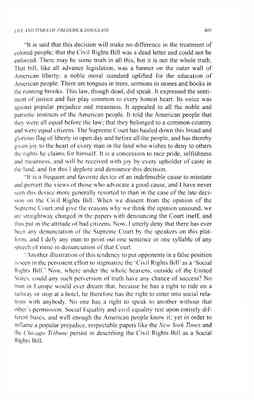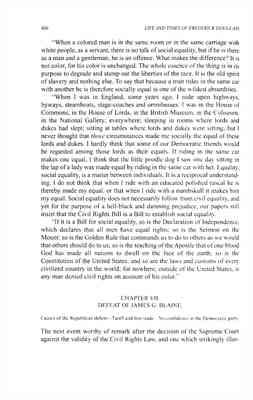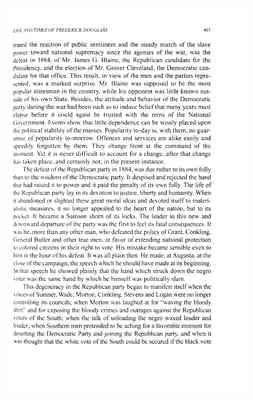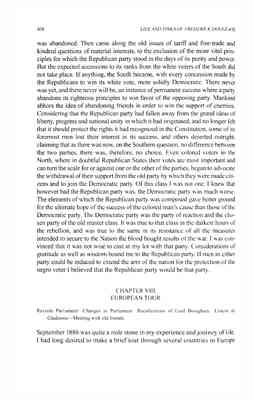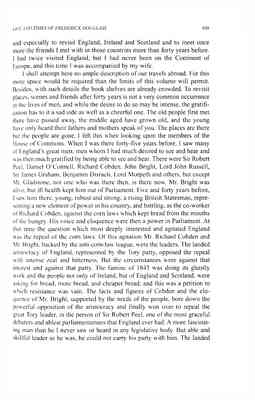Pages
31
LIFE AND TIMES OF FREDERICK DOUGLASS
405
"It is said that this decision will make no difference in the treatment of colored people; that the Civil Rights Bill was a dead letter and could not be enforced. There may be some truth in all this, but it is not the whole truth. That bill, like all advance legislation, was a banner on the outer wall of American liberty; a noble moral standard uplifted for the education of American people. There are tongues in trees, sermons in stones and books in the running brooks. This law, though dead, did speak. It expressed the sentiment of justice and fair play common to every honest heart. Its voice was against popular prejudice and meanness. It appealed to all the noble and patriotic instincts of the American people. It told the American people that they were all equal before the law; that they belonged to a common country and were equal citizens. The Supreme Court has hauled down this broad and glorious flag of liberty in open day and before all the people, and has thereby given joy to the heart of every man in the land who wishes to deny to others the rights he claims for himself. It is a concession to race pride. selfishness and meanness, and will be received with joy by every upholder of caste in the land, and for this I deplore and denounce this decision.
"It is a frequent and favorite device of an indefensible cause to misstate and pervert the views of those who advocate a good cause, and I have never seen this device more generally resorted to than in the case of the late decision on the Civil Rights Bill. When we dissent from the opinion of the Supreme Court and give the reasons why we think the opinion unsound, we are straightway charged in the papers with denouncing the Court itself, and thus put in the attitude of bad citizens. Now, I utterly deny that there has ever been any denunciation of the Supreme Court by the speakers on this platform, and I defy any man to point out one sentence or one syllable of any speech of mine in denunciation of that Court.
"Another illustration of this tendency to put opponents in a false position is seen in the persistent effort to stigmatize the 'Civil Rights Bill' as a 'Social Rights Bill.' Now, where under the whole heavens, outside of the United States, could any such perversion of truth have any chance of success? No man in Europe would ever dream that, because he has a right to ride on a railway or stop at a hotel, he therefore has the right to enter into social relations with anybody. No one has a right to speak to another without that other's permission. Social Equality and civil equality rest upon entirely different bases, and well enough the American people know it; yet in order to inflame a popular prejudice, respectable papers like the New York Times and the Chicago Tribune persist in describing the Civil Rights Bill as a Social Rights Bill.
32
406
LIFE AND TIMES OF FREDERICK DOUGLASS
"When a colored man is in the same room or in the same carriage with white people, as a servant, there is no talk of social equality, but if he is there as a man and a gentleman, he is an offence. What makes the difference? It is not color, for his color is unchanged. The whole essence of the thing is in its purpose to degrade and stamp out the liberties of the race. It is the old spirit of slavery and nothing else. To say that because a man rides in the same car with another he is therefore socially equal is one of the wildest absurdities.
"When I was in England, some years ago, I rode upon highways, byways, steamboats, stage-coaches and omnibusses. I was in the House of Commons, in the House of Lords, in the British Museum, in the Coliseum, in the National Gallery; everywhere; sleeping in rooms where lords and dukes had slept; sitting at tables where lords and dukes were sitting, but I never thought that those circumstances made me socially the equal of these lords and dukes. I hardly think that some of our Democratic friends would be regarded among those lords as their equals. If riding in the same car makes one equal, I think that the little poodle dog I saw one day sitting in the lap of a lady was made equal by riding in the same car with her. Equality, social equality, is a matter between individuals. It is a reciprocal understanding. I do not think that when I ride with an educated polished rascal he is thereby made my equal, or that when I ride with a numbskull it makes him my equal. Social equality does not necessarily follow from civil equality, and yet for the purpose of a hell-black and damning prejudice, our papers still insist that the Civil Rights Bill is a Bill to establish social equality.
"If it is a Bill for social equality, so is the Declaration of Independence, which declares that all men have equal rights; so is the Sermon on the Mount; so is the Golden Rule that commands us to do to others as we would that others should do to us; so is the teaching of the Apostle that of one blood God has made all nations to dwell on the face of the earth; so is the Constitution of the United States, and so are the laws and customs of every civilized country in the world; for nowhere, outside of the United States, is any man denied civil rights on account of his color."
CHAPTER VII. DEFEAT OF JAMES G. BLAINE.
Causes of the Republican defeat---Tariff and free trade--- No confidence in thc Democratic party.
The next event worthy of remark after the decision of the Supreme Court against the validity of the Civil Rights Law, and one which strikingly [illustrated]
33
LIFE AND TIMES OF FREDERICK DOUGLASS
407
[illustrated] the reaction of public sentiment and the steady march of the slave power toward national supremacy since the agonies of the war, was the defeat in 1884, of Mr. James G. Blaine, the Republican candidate for the Presidency, and the election of Mr. Grover Cleveland, the Democratic candidate for that office. This result, in view of the men and the parties represented, was a marked surprise. Mr. Blaine was supposed to be the most popular statesman in the country, while his opponent was little known outside of his own State. Besides, the attitude and behavior of the Democratic party during the war had been such as to induce belief that many years must elapse before it could again be trusted with the reins of the National Government. Events show that little dependence can be wisely placed upon the political stability of the masses. Popularity to-day is, with them, no guarantee of popularity to-morrow. Offences and services are alike easily and speedily forgotten by them. They change front at the command of the moment. Yet it is never difficult to account for a change, after that change has taken place, and certainly not, in the present instance.
The defeat of the Republican party in 1884, was due rather to its own folly than to the wisdom of the Democratic party. It despised and rejected the hand that had raised it to power and it paid the penalty of its own folly. The life of the Republican party lay in its devotion to justice, liberty and humanity. When it abandoned or slighted these great moral ideas and devoted itself to materialistic measures, it no longer appealed to the heart of the nation, but to its pocket. It became a Samson shorn of its locks. The leader in this new and downward departure of the party was the first to feel its fatal consequences. It was he, more than any other man, who defeated the policy of Grant Conkling, General Butler and other true men, in favor of extending national protection to colored citizens in their right to vote. His mistake became sensible even to him in the hour of his defeat. It was all plain then. He made, at Augusta, at the close of the campaign, the speech which he should have made at its beginning. In that speech he showed plainly that the hand which struck down the negro voter was the same hand by which he himself was politically slain.
This degeneracy in the Republican party began to manifest itself when the voices of Sumner, Wade, Morton, Conkling, Stevens and Logan were no longer controlling its councils; when Morton was laughed at for "waving the bloody shirt" and for exposing the bloody crimes and outrages against the Republican voters of the South; when the talk of unloading the negro waxed louder and louder; when Southern men pretended to be aching for a favorable moment for deserting the Democratic Party and joining the Republican party, and when it was thought that the white vote of the South could be secured if the black vote
34
408
LIFE AND TIMES OF FREDERICK D0U0LASS
was abandoned. Then came along the old issues of tariff and free-trade and kindred questions of material interests, to the exclusion of the more vital principles for which the Republican party stood in the days of its purity and power. But the expected accessions to its ranks from the white voters of the South did not take place. If anything, the South became, with every concession made by the Republicans to win its white vote, more solidly Democratic. There never was yet, and there never will be, an instance of permanent success where a party abandons its righteous principles to win favor of the opposing party. Mankind abhors the idea of abandoning friends in order to win the support of enemies. Considering that the Republican party had fallen away from the grand ideas of liberty, progress and national unity in which it had originated, and no longer felt that it should protect the rights it had recognized in the Constitution, some of its foremost men lost their interest in its success, and others deserted outright, claiming that as there was now, on the Southern question, no difference between the two parties, there was, therefore, no choice. Even colored voters in the North, where in doubtful Republican States their votes are most important and can turn the scale for or against one or the other of the parties, began to advocate the withdrawal of their support from the old party by which they were made citizens and to join the Democratic party. Of this class I was not one. I knew that however bad the Republican party was, the Democratic party was much worse. The elements of which the Republican party was composed gave better ground for the ultimate hope of the success of the colored man's cause than those of the Democratic party. The Democratic party was the party of reaction and the chosen party of the old master class. It was true to that class in the darkest hours of the rebellion, and was true to the same in its resistance of all the measures intended to secure to the Nation the blood bought results of the war. I was convinced that it was not wise to cast in my lot with that party. Considerations of gratitude as well as wisdom bound me to the Republican party. If men in either party could be induced to extend the arm of the nation for the protection of the negro voter I believed that the Republican party would be that party.
CHAPTER VIII.
EUROPEAN TOUR.
Revisits Parliament–Changes in Parliament–Recollections of Lord Brougham Listens to Gladstone–Meeting with old friends.
September 1886 was quite a mile stone in my experience and journey of life. I had long desired to make a brief tour through several countries in Europe
35
LIFE AND TIMES OF FREDERICK DOUGLASS
409
and especially to revisit England, Ireland and Scotland and to meet once more the friends I met with in those countries more than forty years before. I had twice visited England, but I had never been on the Continent of Europe, and this time I was accompanied by my wife.
I shall attempt here no ample description of our travels abroad. For this more space would be required than the limits of this volume will permit. Besides, with such details the book shelves are already crowded. To revisit places, scenes and friends after forty years is not a very common occurrence in the lives of men, and while the desire to do so may be intense, the gratification has to it a sad side as well as a cheerful one. The old people first met there have passed away, the middle aged have grown old, and the young have only heard their fathers and mothers speak of you. The places are there but the people are gone. I felt this when looking upon the members of the House of Commons. When I was there forty-five years before, I saw many of England's great men; men whom I had much desired to see and hear and was then much gratified by being able to see and hear. There were Sir Robert Peel, Daniel O'Connell, Richard Cobden, John Bright, Lord John Russell, Sir James Graham, Benjamin Disraeli, Lord Morpeth and others, but except Mr. Gladstone, not one who was there then, is there now. Mr. Bright was alive, but ill health kept him out of Parliament. Five and forty years before, I saw him there, young, robust and strong; a rising British Statesman, representing a new element of power in his country, and battling, as the co-worker of Richard Cobden, against the corn laws which kept bread from the mouths of the hungry. His voice and eloquence were then a power in Parliament. At that time the question which most deeply interested and agitated England was the repeal of the corn laws. Of this agitation Mr. Richard Cobden and Mr. Bright, backed by the anti-corn-law league, were the leaders. The landed aristocracy of England, represented by the Tory party, opposed the repeal with intense zeal and bitterness. But the circumstances were against that interest and against that party. The famine of 1845 was doing its ghastly work and the people not only of Ireland, but of England and Scotland, were asking for bread, more bread, and cheaper bread; and this was a petition to which resistance was vain. The facts and figures of Cobden and the eloquence of Mr. Bright, supported by the needs of the people, bore down the powerful opposition of the aristocracy and finally won over to repeal the great Tory leader, in the person of Sir Robert Peel, one of the most graceful debaters and ablest parliamentarians that England ever had. A more fascinating man than he I never saw or heard in any legislative body. But able and skillful leader as he was, he could not carry his party with him. The landed
